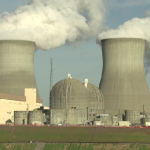For months, state regulators at the Public Service Commission and attorneys for Georgia Power have been tasked with negotiating a risk sharing mechanism (RSM) to provide some protection for ratepayers in the event of cost overruns for the two new nuclear reactors under construction at Plant Vogtle.
Mere days before a final vote by the PSC, state regulators appear to have caved in to Georgia Power’s staunch opposition to any such mechanism by entering into a settlement agreement with the Company that does no more than re-state Georgia law and current regulatory policy. The settlement expressly provides that PSC staff will withdraw its support of the two risk sharing mechanisms it has previously submitted for Georgia Power’s and the Commission’s consideration.
Yesterday the PSC held its final public discussion on the RSM issue. By all accounts, a majority of the commissioners appear ready to approve the settlement at the Commission’s Administrative Session on Tuesday, August 2nd.
“The settlement currently before the commission leaves ratepayers completely exposed to cost overruns, without any potential relief whatsoever,” said Georgia Watch Consumer Energy Director Clare McGuire, who spoke at Thursday’s committee meeting. “Ratepayers will be solely responsible for cost overruns and, in addition, Georgia Power will earn its normal profit margin of more than 11 percent even if the project comes in over budget.”
Georgia Watch has repeatedly advocated for the adoption of a risk sharing mechanism proposed by Staff in December 2010, which provides for an incremental decrease to Georgia Power’s profit margin if costs balloon to more than $300 million over the already-certified $6.1 billion project cost. This December proposal would allow Georgia Power to recover all project costs deemed prudent by the PSC, even if these costs are above the certified amount.
“The December RSM calls for Georgia Power to put at least some skin in the game while providing a minimal level of protection for ratepayers,” said McGuire. “Given the notoriously risky nature of nuclear plant construction and the high likelihood of cost overruns associated with such projects, there needs to be a mechanism in place to limit ratepayer exposure to cost overruns.”
McGuire stressed that the only way to ensure some baseline, minimal protection for ratepayers is for the Company’s profits to be tied, in some way, to the total project costs and that anything less affords no protection whatsoever to ratepayers from the likely cost overruns associated with a nuclear construction project of this magnitude.
“If the Commission approves this settlement, nothing will have been accomplished beyond maintaining the status quo of unlimited ratepayer exposure to total project costs for this multibillion-dollar project,” said McGuire.
For more information on the RSM negotiations, click here:

